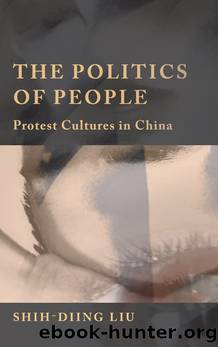The Politics of People: Protest Cultures in China by Shih-Diing Liu

Author:Shih-Diing Liu [Liu, Shih-Diing]
Language: eng
Format: epub
Tags: Political Science, General
ISBN: 9781438476216
Google: TK-rDwAAQBAJ
Goodreads: 43971526
Publisher: SUNY Press
Published: 2019-09-01T00:00:00+00:00
Conclusion
The political significance of performative politics should be situated in a particular relationship of the forces unleashed during the process of state reconfiguration since the 1990s. This chapter has looked at the specific condition of possibility and constraint for performative politics, in particular the shifting and ambivalent role of the state in configuring new patterns of political interaction. The analysis presented in this chapter addresses the ambiguity of the Chinese performative context, where there are no opposition parties or an effective legislature, and the state-society relation has evolved a distinct trajectory. In mainland China popular politics has evolved an intimate relationship with the state, and the distinction between two is not self-evident. Although existing studies have attested to the way âpersistent collective acts produce an aggregate impact on high-level authorities that makes policy changes possibleâ (Cai 2006, 117), there has been an arguably instrumentalist and rationalist tendency that privileges predetermined opportunities, incentives, costs, and benefits, without situating popular struggle within the broader political dynamics of state re-legitimation, and taking into consideration the performative possibilities created by the redeployment of state norms and symbolic resources. In existing studies, opportunity tends to be reified in terms of formal structure of power, or as derivative of institutional, rather than something being created and enacted in concrete expressive practices through which individuals become rights-seeking subjects. Even if some scholars recognize that âcontentious interaction takes place within limits set by political opportunity structure, regime controls, and available repertoiresâ (Tilly and Tarrow 2007, 84), it is necessary to point out that the opportunity structure is not completely frozen or predetermined by party elites, and controls are constantly contested and redeployed by protestors performatively. These contingent practices, rather than the static structure alone, create possibilities of agency and political spaces for struggle. The predominant focus on material interest and economically driven actions in the field of Chinese protest movement studies (for example, Cai 2006; OâBrien 2008) runs the risk of militating against a political analysis that takes into account the subversive effects of expressive actions. This chapter argues that although the structural condition of state intervention is crucial, it has to be understood in terms of the stateâs legitimation crisis, and the counter-hegemonic practices of the people that create and exploit the crisis.
If most of the protests in mainland China are marked by a lack of horizontal articulation among different groups, Hong Kong represents a distinctly different way of articulating performative politics. Compared to mainland China, the enclave offers a more favourable strategic condition where popular political activities are embedded in a multi-party structure, and enjoy more freedom to formulate alliances. Due to the different institutional context and political culture, the political form of popular mobilization and interaction with the state can often entail different levels of disruption and intensity. The next chapter describes the ways political activism is performed in a postcolonial context of legitimation crisis. What are the fundamental contradictions in Hong Kong? How do Hong Kong protestors create and sustain their spaces of appearance
Download
This site does not store any files on its server. We only index and link to content provided by other sites. Please contact the content providers to delete copyright contents if any and email us, we'll remove relevant links or contents immediately.
| Africa | Americas |
| Arctic & Antarctica | Asia |
| Australia & Oceania | Europe |
| Middle East | Russia |
| United States | World |
| Ancient Civilizations | Military |
| Historical Study & Educational Resources |
Machine Learning at Scale with H2O by Gregory Keys | David Whiting(4283)
Never by Ken Follett(3922)
Fairy Tale by Stephen King(3358)
Oathbringer (The Stormlight Archive, Book 3) by Brandon Sanderson(3110)
The Man Who Died Twice by Richard Osman(3055)
Will by Will Smith(2891)
Rationality by Steven Pinker(2344)
Can't Hurt Me: Master Your Mind and Defy the Odds - Clean Edition by David Goggins(2312)
The Dark Hours by Michael Connelly(2290)
Friends, Lovers, and the Big Terrible Thing by Matthew Perry(2208)
The Dawn of Everything: A New History of Humanity by David Graeber & David Wengrow(2183)
Principles for Dealing With the Changing World Order: Why Nations Succeed and Fail by Ray Dalio(2028)
HBR's 10 Must Reads 2022 by Harvard Business Review(1828)
A Short History of War by Jeremy Black(1827)
Go Tell the Bees That I Am Gone by Diana Gabaldon(1743)
A Game of Thrones (The Illustrated Edition) by George R. R. Martin(1698)
515945210 by Unknown(1654)
Kingdom of Ash by Maas Sarah J(1653)
443319537 by Unknown(1538)
